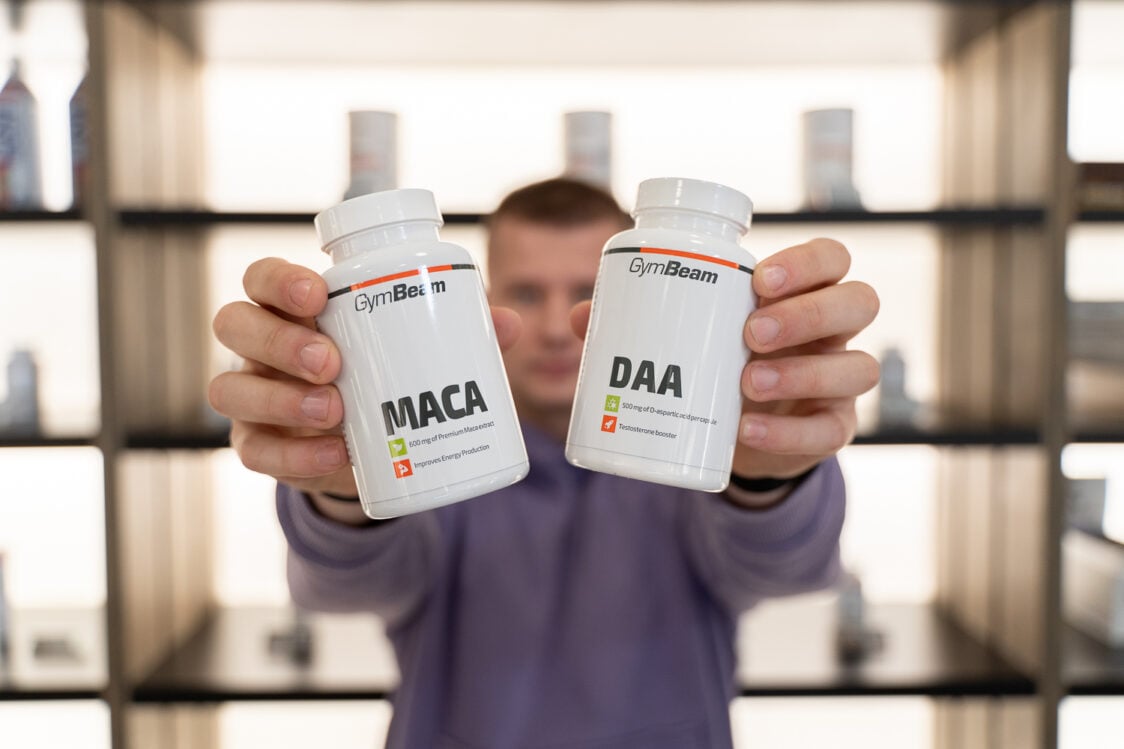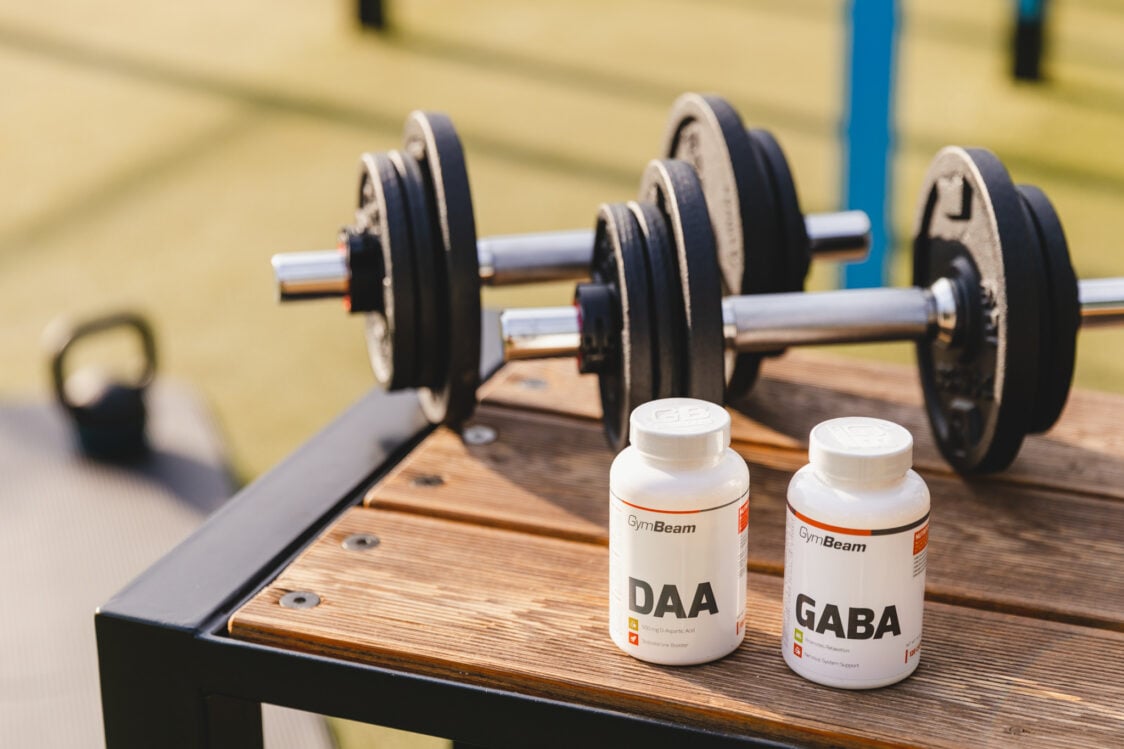Table of Contents
D-Aspartic acid, also called DAA, has built a reputation as a substance that supports testosterone production. This testosterone booster is especially popular among athletes who want to build muscle or take care of their reproductive health. How do scientists view DAA and what other promising health effects does it have?
In this article you will read about the effect of DAA on these specific areas:
What is D-Aspartic acid (DAA)?
D-Aspartic acid, also known as DAA, is a non-essential amino acid that is naturally found in the body. It accumulates mainly in the endocrine glands (the part of the body where hormones are made) and the brain, which is where its main benefits are related. In fact, it is best known for its involvement in hormone production, whether in the brain or elsewhere in the body. [6]
There is also a second form of aspartic acid, namely L-aspartic acid. However, this is only used by the body as a building block in muscle formation, like many other amino acids. Unlike D-aspartic acid, it has no other significant health effects. [2,6]
In case you are interested in more specific information about amino acids, you will definitely welcome our comprehensive article Amino Acids: The Classification, Functions in the Body, Effect on Athletic Performance and the Best Sources.

What are the health benefits of DAA?
It turns out that the role of DAA in the body is primarily related to hormones. However, it also boasts other promising effects, such as those on the brain and nervous system. However, research concerning D-aspartic acid is far from complete. More studies are needed to understand exactly how it works and which areas of health it benefits.
1. Involved in the formation of sex hormones
In studies, it turns out that the fundamental effect of DAA is its involvement in the formation of sex hormones. In fact, it is abundantly present in the very parts of the body where their production begins. First and foremost, it is the hypothalamus (the lower part of the midbrain). It is there that hormones are produced, which further promote the production of hormones in the pituitary gland (subcortical gland). These eventually spur the formation of male and female sex hormones (testosterone, oestrogen). [7,8]
If any piece of this puzzle were missing, sex hormone production would be disrupted. It is the DAA that is concentrated in each of these key sites, and so it seems to play an important role in the whole process. Researchers point out that taking DAA has been shown in studies to result in higher levels of these hormones. Thus, it could be essential for their formation and for fertility, muscle growth or egg maturation in women, which are due to sex hormones. [7]
2. Helps increase testosterone levels
DAA is known as a testosterone booster or even a steroid replacement. This is precisely because of its effect on the production of the male sex hormone testosterone. As we have already described above, studies show that DAA is an ingredient in those processes that lead to its formation.
DAA is involved in the release of gonadoliberin, which is a hormone in the hypothalamus that further leads to the production of luteinising hormone in the pituitary gland. The latter is then tasked with promoting the production of testosterone. In addition, however, it turns out that D-aspartic acid could also act in other ways, for example by binding directly to Leydig cells in the testes, where testosterone is produced. [5,7]
Scientists need to conduct more research to be more definitive on this topic. For now, however, it looks like DAA is proving to be effective, especially in men with initially low testosterone levels. The study even showed a positive effect in infertile men. Thus, it could be an interesting nutritional supplement for those struggling with symptoms of insufficient levels of this male sex hormone. [5]
- How exactly this deficiency manifests itself and how to cope with it will be revealed to you in our article 10 Symptoms of Testosterone Deficiency – What Causes It and How to Deal With It?
- If you’re interested in more tips on men’s health, don’t miss our article Men and Nutrition: ‘The Most Important Vitamins and Minerals for Health, Testosterone and Performance.
You might be interested in these products:
3. Has a positive effect on oestrogen production and female reproductive health
Similarly to testosterone, oestrogen production practically begins in the hypothalamus, where D-aspartic acid is involved in this process. Hormones from the hypothalamus thus lead to the release of luteinising hormone from the pituitary gland, which is further tasked with promoting oestrogen production. Its low levels are typical, for example, during menopause. This is accompanied by symptoms such as hot flushes or reduced bone density. DAA could therefore also be useful in this situation, but more research is needed before it can be confidently recommended as a supplement to alleviate menopausal symptoms. [4,8]
Together with the aforementioned luteinising hormone, follicle-stimulating hormone is also produced. In addition to promoting the formation of oestrogen, it is also responsible for encouraging the maturation of eggs. It is thus an important part of the menstrual cycle. D-aspartic acid can thus come in handy in taking care of a woman’s overall reproductive health.
If you are wondering what other substances can be beneficial for women’s health, don’t miss our article Women and Nutrition: The Most Important Vitamins and Minerals for Health and Beauty.

4. May influence sperm production
Along with its effect on testosterone, DAA may also have a positive effect on sperm production and function in men. Since this amino acid accumulates in ejaculate, scientists speculate that it is involved in spermatogenesis. In addition, studies have shown a link between lower DAA concentrations in the body and lower sperm counts as well as less sperm movement (motility). [1,7]
Maca, for example, can also have a positive effect on sperm production and activity. For more information on maca and its benefits, see our article Maca: What are the Effects of this Superfood and How to Supplement?

5. Has an effect on the nervous system
D-aspartic acid accumulates in synapses, which is where two nerve cells (neurons) connect. Through synapses, information is transferred between individual neurons, making them very important functional parts of the nervous system. They are the ones that keep the nervous system running smoothly and connect it to the muscles, digestion or other parts of the body. It turns out that DAA may also play a role in this process.
Research conducted so far suggests that DAA is also involved in the production of neurotransmitters or even acts as a neurotransmitter itself. These are substances that pass across synapses from one neuron to another, transferring information between them. Thanks to neurotransmitters, for example, your memory, muscles and countless other processes in the body can function properly.
Apparently, D-aspartic acid could also be useful for cognitive functions, such as memory or learning ability.
So-called nootropics, such as ashwagandha or GABA, can also help to support cognitive function. More about nootropics and their benefits can be found in our article Nootropics: Substances for Improving Concentration and Memory. Which Are the Best?
Discover our bestsellers:
6. Can assist with muscle growth
Testosterone has an important effect on strength and muscle growth in men. It is through this that D-Aspartic acid could be useful in building muscle mass and achieving maximum performance in strength training. Research also suggests that DAA could be an interesting nutritional supplement for strength athletes.
However, the results of studies are not consistent in this area. Thus, more scientific research is still needed to provide clarity on how DAA specifically acts on the muscles. You can supplement with this amino acid when you want to promote muscle growth, but remember that the key is to focus on quality training and nutrition. [3,5]
For more information on how to set up your workout and diet properly, check out our article What to Eat and How to Workout to Finally Gain Muscle?

Other benefits of DAA
- Studies suggest that it could also play a role in the production of melatonin (the sleep hormone). [2]
- Thanks to its action on testosterone, it could also have a positive effect on erectile dysfunction. Arginine, may also be useful for this.
- Positive effects have also been shown in research for psychiatric illnesses such as schizophrenia. [3]
Can DAA have adverse effects?
No significant adverse effects have been observed with the use of this amino acid. However, it is not recommended to take it while pregnant or breastfeeding. Its action has not been thoroughly investigated during these periods of life. [1,6]
Can DAA interact with medications?
Like other supplements, DAA can clash with some medications. Which ones to watch out for?
- medications to support testosterone production
- hormone therapy
- fertility medications
- antidepressants and other drugs that affect the nervous system
In general, however, if you suffer from a medical condition and are taking medication, it is always a good idea to consult your doctor before taking any new supplement.
How should you take DAA?
The dosage of D-aspartic acid has a relatively simple schema. It is recommended to take 2000-3000 mg daily. Similar doses are also used in studies. [6]
What can you combine DAA with?
DAA has many promising health benefits. However, in order to achieve the desired effect, it can also be combined with other active ingredients.
What can you do to support each of these health aspects?
- Male health and testosterone levels: For men, the intake of zinc, selenium or vitamin D, for example, is important in this respect. However, plant products such as Tribulus terrestris, fenugreek, saw palmetto or maca also have positive health benefits.
- Women’s health and oestrogen levels: Women are advised to check their intake of iron, folic acid or iodine. For example, maca can be a useful herbal supplement.
- Brain and cognitive function: Nootropics can be beneficial for brain function. Examples include ashwagandha, ginseng or GABA. Combining them in the form of complex supplements is also an option.
- Supports athletic performance: Sports performance is easily boosted with stimulants, such as caffeine. NO boosters, such as arginine or citrulline malate, can support performance.

What should you remember?
D-Aspartic acid is especially known for its effect on testosterone. As you have already found out in this article, its influence on hormones in the body is quite complex and through them it can also affect other areas of health, such as sperm production or muscle growth. Although the research is still inconclusive and more studies are needed on the benefits of DAA, one thing that is already known is that it can be an interesting addition to a healthy diet and a good workout plan.
Was the article useful for you? If you liked it, or if it provided you with new information, we would be delighted if you would share it with your friends and inner circle.
[1] D’ANIELLO, G. et al. D-Aspartate, a Key Element for the Improvement of Sperm Quality. – https://www.scirp.org/journal/paperinformation.aspx?paperid=24016
[2] D’ANIELLO, G. et al. Occurrence of D-aspartic acid in human seminal plasma and spermatozoa: possible role in reproduction. – https://pubmed.ncbi.nlm.nih.gov/16275242/
[3] HOLEČEK, M. Aspartic Acid in Health and Disease. – https://www.mdpi.com/2072-6643/15/18/4023
[4] CHENG, Y.-J. et al. From Menopause to Neurodegeneration—Molecular Basis and Potential Therapy. – https://www.ncbi.nlm.nih.gov/pmc/articles/PMC8395405/
[5] ROSHANZAMIR, F. - SAFAVI, S.M. The putative effects of D-Aspartic acid on blood testosterone levels: A systematic review. – https://www.ncbi.nlm.nih.gov/pmc/articles/PMC5340133/
[6] SOLOMON, T. D-Aspartic Acid Research Analysis. – https://examine.com/supplements/d-aspartic-acid/
[7] TOPO, E. et al. The role and molecular mechanism of D-aspartic acid in the release and synthesis of LH and testosterone in humans and rats. – https://www.ncbi.nlm.nih.gov/pmc/articles/PMC2774316/
[8] The Hypothalamic-Pituitary-Gonadal Axis - Holland-Frei Cancer Medicine - NCBI Bookshelf. – https://www.ncbi.nlm.nih.gov/books/NBK13386/


Add a comment